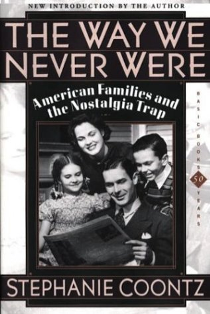|
Pivotal role of marriage is an illusion
in American family life
Newsday
/
May 3, 2005
Commentary by Stephanie
Coontz, Ph.D.

Thirteen years ago Vice President Dan
Quayle attacked the producers of TV sitcom's Murphy Brown for
letting her character bear a child out of wedlock, claiming that the
show's failure to defend traditional family values was encouraging
America's youth to abandon marriage.
His speech kicked off more than a decade of outcries against the
"collapse of the family." Today such attacks have given way to a
kinder, gentler campaign to promote marriage, with billboards
declaring that "Marriage Works" and books making "the case for
marriage."
But recent changes in marriage are part of a worldwide upheaval in
family life that has transformed the way people conduct their
personal lives as thoroughly and permanently as the Industrial
Revolution transformed working lives 200 years ago. Marriage is no
longer the main way in which societies regulate sexuality and
parenting or organize the division of labor between men and women.
And although some people hope to turn back the tide by promoting
traditional values, making divorce harder to obtain or outlawing gay
marriage, they are having to confront a startling irony: The very
factors that have made marriage more satisfying in modern times have
also made it more optional.
The origins of modern marital instability lie largely in the triumph
of what many people believe to be marriage's traditional role -
providing love, intimacy, fidelity and mutual fulfillment. The truth
is that for centuries, marriage was stable precisely because it was
not expected to provide such benefits. As soon as love became the
driving force behind marriage, people began to demand the right to
remain single if they had not found love or to divorce if they fell
out of love.
The so-called divorce revolution, however, is just one aspect of the
worldwide transformation of marriage. In places where divorce and
unwed motherhood are severely stigmatized, the retreat from marriage
simply takes another form. In Japan and Italy, for example, women
are far more likely to remain single than in the United States.
The norms and laws that traditionally penalized unwed mothers and
their children have weakened or been overturned, ending centuries of
injustice but further reducing marriage's role in determining the
course of people's lives.
Additionally, from Turkey to South Africa to Brazil, countries are
having to codify the legal rights and obligations of single
individuals and unmarried couples raising children, including
same-sex couples. Canada and the Netherlands have joined Scandinavia
in legalizing same-sex marriage, and such bastions of tradition as
Taiwan and Spain are considering following suit.
None of this means that marriage is dead. Indeed, most people have a
higher regard for the marital relationship today than when marriage
was practically mandatory. Marriage as a private relationship
between two individuals is taken more seriously and comes with
higher emotional expectations than ever before in history.
But marriage as a public institution exerts less power over people's
lives now, and marriage or lack of marriage does not determine
people's political and economic rights anymore.
People may revere the value of universal marriage in the abstract,
but most have adjusted to a different reality. Although many
Americans bemoan the easy accessibility of divorce, few are willing
to waive their personal rights.
Nor does a solution lie in preaching the benefits of marriage to
impoverished couples or in outlawing unconventional partnerships.
Banning same-sex marriage would not undo the existence of
alternatives to traditional marriage.
We may personally like or dislike these changes. We may wish to keep
some and get rid of others. But there is a certain inevitability to
almost all of them.
Marriage is no longer the institution where people are initiated
into sex. It no longer determines the work men and women do on the
job or at home, regulates who has children and who doesn't, or
coordinates care-giving for the ill or the aged. For better or
worse, marriage has been displaced from its pivotal position in
personal and social life, and it will not regain it short of a
Taliban-like counterrevolution.
Forget the fantasy of solving the challenges of modern personal life
by reinstitutionalizing marriage. We must recognize that there are
healthy as well as unhealthy ways to be single or to be divorced,
just as there are healthy and unhealthy ways to be married. We
cannot afford to construct our social policies, our advice to our
own children and even our own emotional expectations around the
illusion that all commitments, sexual activities and care-giving
will take place in a traditional marriage.
Stephanie Coontz teaches family history at Evergreen State College
in Olympia, Wash. , and is author of the new book "Marriage, a
History: From Obedience to Intimacy, or How Love Conquered
Marriage."
|
